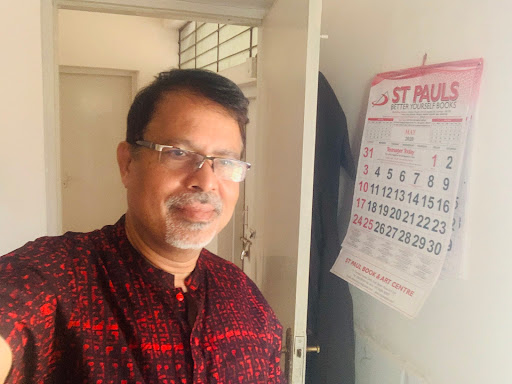September 27, 2015
Twenty-sixth Sunday in Ordinary Time
First Reading: Num 11:25-29
Twenty-sixth Sunday in Ordinary Time
First Reading: Num 11:25-29
No one likes to think of himself as stingy. Yet oftentimes we actually are. When we deeply care about something, we have a tendency to hold it back from others. Whether it be something as serious as refusing to give money to those we can help or something as silly as protecting your personal chocolate supply from thieving family members, our miserly qualities reveal something about the state of our souls. While a parsimonious approach might sometimes be the order of the day, God shows himself to be a generous Giver of good gifts, not a scrooge.
Keeping God in a Tent
In this Sunday’s first reading from Numbers, we find Moses conversing with God again in the tent of meeting. Moses is bent out of shape because the people of Israel have been complaining again and he is feeling the weight of his leadership role. He frankly needs help. The Lord agrees and has Moses invite seventy elders of Israel to the tent of meeting for a special ceremony:
Then the LORD came down in the cloud and spoke to him, and took some of the spirit that was upon him and put it upon the seventy elders; and when the spirit rested upon them, they prophesied. (Num 11:25 RSV)
God redistributes the wealth of Moses’ anointing onto the seventy elders gathered. While before they had simply been older men, now they are all prophets! Moses had been the only one eligible to hear God and speak on his behalf, but now all of these elders take on this prophetic role. The text adds, “they did so no more,” which seems to mean that this prophetic moment was a one-time occurrence. These elders would have new roles of leadership, but would not continually act as prophets.
God Gets Out
Everything seems to be going according to plan until it becomes apparent that two of the appointed seventy elders were no-shows. They overlooked the meeting on their calendars and didn’t make it, but God did not let their truancy get in the way. He let his spirit “rest” on them anyway and they start prophesying out in public (Num 11:26). Horrified by this breach of protocol, Joshua sprints to Moses and asks him to put a stop to Eldad’s and Medad’s prophecies. Moses, unimpressed by his sidekick’s pleadings, expresses the exact opposite notion. Rather than wanting to restrict God’s presence and prophecy to the narrowest group possible, he says “Would that all the Lord’s people were prophets, that the Lord would put his spirit upon them!” (Num 11:29 RSV).
Pouring Out on Pentecost
In fact, God agrees with Moses’ sentiment. He does want his Spirit to be available to everyone. The prophet Joel predicts:
And it shall come to pass afterward, that I will pour out my spirit on all flesh; your sons and your daughters shall prophesy, your old men shall dream dreams, and your young men shall see visions. Even upon the menservants and maidservants in those days, I will pour out my spirit.(Joel 2:28-29 RSV)
The Lord does not want to keep his presence bottled up, but wants it to radiate to everyone. Joel forecasts that knowledge of God and revelation of his will will be available to everyone. This passage comes to fulfillment at Pentecost when the disciples receive the Holy Spirit. St. Peter quotes it and says it is now fulfilled as he preaches on that day in Acts 2:16-21. The outpouring of the Spirit only loosely anticipated by the story of the prophetic elders in Numbers comes to fruition on the birthday of the Church.
Spreading the Goodness
It is a principle of Catholic philosophy that “the good is diffusive of itself.” Oak trees give acorns, flowers give their fragrance, bunnies make more bunnies. Goodness spreads. It is meant to. God, who is good, does not want to hide from view and turn in on himself like a selfish recluse. He wants to give himself, to spread his goodness around, to get involved in our lives. When the spirit of God gets out of the normal frame of reference—in Joshua’s case, the tent of meeting—then all of the sudden, God becomes unpredictable. He upends Joshua’s expectations by showing up in the camp, so we shouldn’t be surprised if he does unpredictable things in our lives. We might find him in places we don’t think he belongs
Keeping God in a Box
This is where this passage can hit home. On the one hand, we can “keep God in a box” by limiting him to a certain time and a certain place—usually an hour on Sunday. That can be our God-box where we meet with him, but if he intervenes in some other area of our life, at an unexpected time, we can be shocked, put off, even angry. Yet God wants to be present in our whole life, not just in a given time or place. He wants to “diffuse” his goodness in every area. We can also keep God in a box by trying to restrict who has access to him or whom he has access to. When we discover him, we can want to hog him for ourselves, but God cannot be confined by our petty-minded selfishness. He is free to reach anyone whom he wants to reach. If we are open to being a conduit of his grace rather than a log-jam, some great things can happen. Letting God out of the boxes we put him in might just let us experience some of the grace that those ancient Israelite elders did and start to fulfill Moses’ sighing wish, “Would that all the Lord’s people were prophets!”

No comments:
Post a Comment